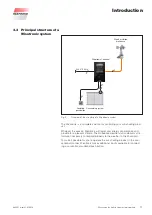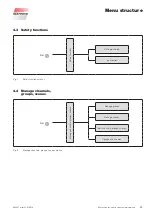
890557_d•en•01.07.2014
We reserve the right to carry out improvements
19
NOTE
In these instructions we only use the term "Channel".
The Wisotronic always activates products through logic channels. The follow-
ing product types can presently be activated using the Wisotronic:
Articulated arm awning
Inside roller blind
Conservatory awning
Vertical awning
External venetian blind
Facade awning
Roller shutters
Drop-arm awning
Pleated blind
Markisolette
Venetian blind
Fault alarm contact
Window
A product is connected directly to the outputs of a switch actuator of the
Wisotronic. It requires one or two switching outputs; for example, sun shad-
ing products require two switching outputs for raising and lowering.
3.4.2 Nroups
If you want to drive several channels together, they can be combined into a
group. You can then, for example, raise or lower the conservatory awning
and the external venetian blind of a conservatory together.
NOTE
The group “inherits” the product properties of the
first
assigned channel; if
this is a roller shutter, for example, then the operating behaviour of the group
corresponds to that of a roller shutter even if other slat products or windows
belong to this group.
Of course, channels with identical products can also be combined to a
group. For example, if you have created a channel for the roller shutters
of each room, then all roller shutters of the building can be combined in a
group and moved together.
A maximum of 4 groups can be created.
NOTE
This function is not available for Wisotronic 1-channel since is does not have
more than one channel.
3.4.3 Scenes
A scenario (e.g. “roller shutter DOWN, articulated arm awning UP, window
CLOSED” when leaving the flat) can be stored (“learned”) in a scene and be
called at a later time.
For this, one or more channels are associated with the scene and the posi-
tions and states are set as desired. After the scene is stored, this scenario
can be recalled at any time by selecting the scene.
A maximum of 4 scenes can be created.
Introduction
















































